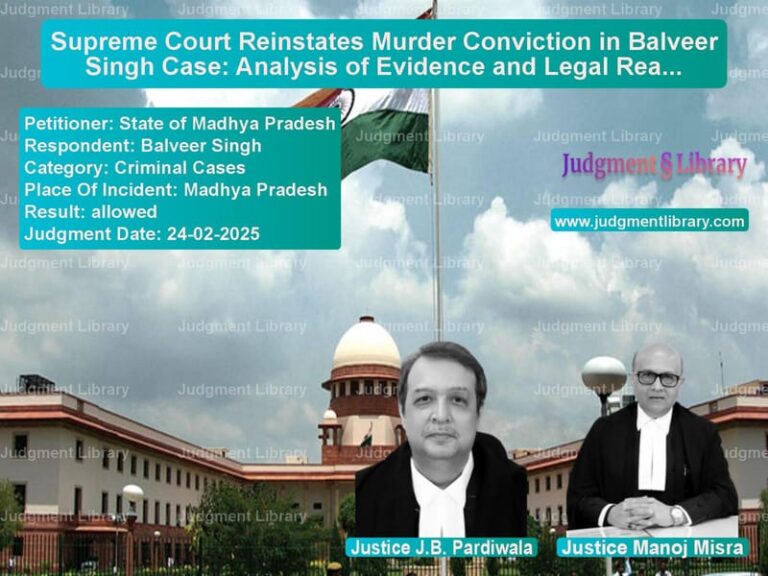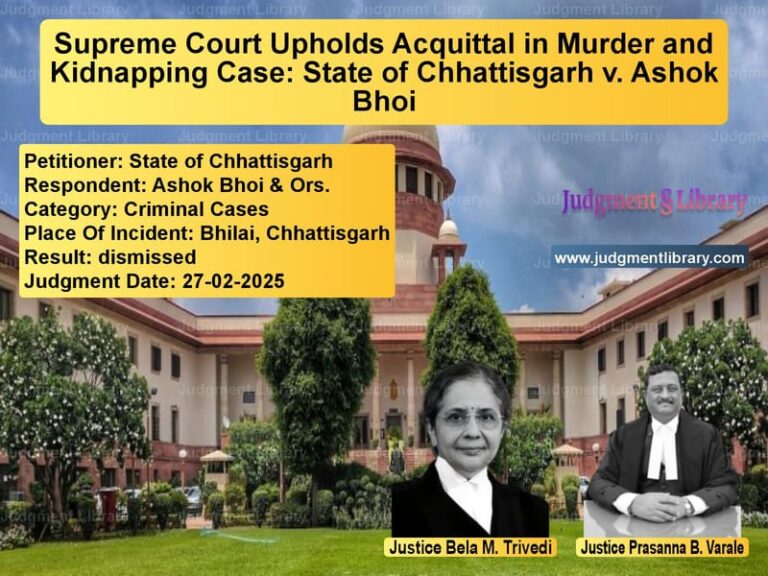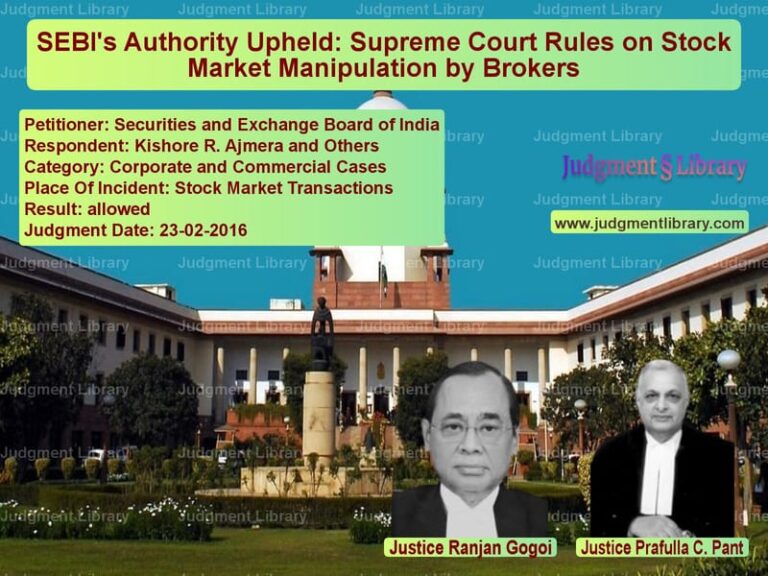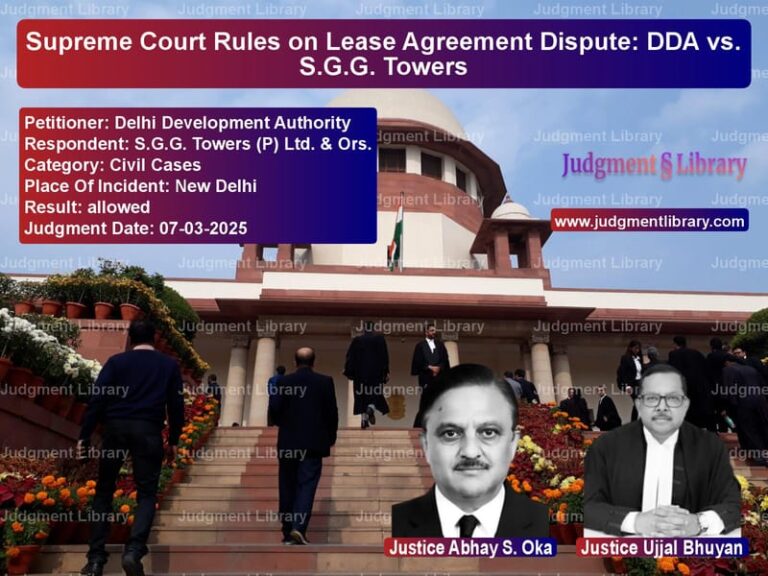Supreme Court Restores Full Refund for Homebuyer in Consumer Dispute Case
The Supreme Court of India, on August 24, 2022, delivered a crucial ruling in the case of Ravinder Singh Chana vs. Khanna Properties and Infrastructures Pvt. Ltd.. The case involved a homebuyer who had paid a substantial amount for a flat that was never completed. The Supreme Court set aside an order of the National Consumer Disputes Redressal Commission (NCDRC) and restored the earlier order of the Madhya Pradesh State Consumer Dispute Redressal Commission, directing the builder to refund the entire amount paid by the homebuyer with interest.
This ruling reinforces consumer rights and ensures that developers cannot escape their obligations to refund homebuyers when projects are delayed or abandoned.
Background of the Case
The case originated from a complaint filed by Ravinder Singh Chana against Khanna Properties and Infrastructures Pvt. Ltd. The complaint was related to a flat purchase, where the developer failed to deliver possession despite receiving payments.
Read also: https://judgmentlibrary.com/supreme-court-sets-aside-telangana-high-court-order-in-property-dispute/
The Madhya Pradesh State Consumer Dispute Redressal Commission, Bhopal (State Commission), in its order dated October 15, 2020, ruled in favor of the complainant and ordered the developer to:
- Refund Rs. 21,18,000 to the appellant.
- Pay 9% simple interest per annum from January 19, 2015 (the last deposit date) until the refund is realized.
- Pay Rs. 5,000 as litigation expenses.
Appeal Before NCDRC
The developer challenged the State Commission’s decision before the National Consumer Disputes Redressal Commission (NCDRC). The NCDRC partially modified the order on February 17, 2022, reducing the refund amount to Rs. 16,18,000 while maintaining the 9% interest per annum.
This modification prompted the homebuyer to approach the Supreme Court, arguing that the reduction was unjustified.
Arguments Before the Supreme Court
Appellant’s (Homebuyer) Arguments
Senior Advocate Akshat Shrivastava, representing the appellant, argued:
- The State Commission had passed a well-reasoned order, and the NCDRC had no valid grounds to reduce the refund amount.
- The homebuyer had paid the full amount based on assurances given by the builder, and the construction was never completed.
- The developer had failed to honor the agreement and had caused financial distress to the buyer.
Respondent’s (Developer) Arguments
The developer’s counsel, Yashish Chandra, argued:
- The refund should be calculated based on actual payments received and deductions applicable.
- The NCDRC’s modification was justified, as certain components of the payment were refundable while others were non-refundable.
- The delay was due to factors beyond the builder’s control.
Supreme Court’s Observations
1. Unjustified Reduction by NCDRC
The Supreme Court found that the NCDRC had no valid reason to modify the order:
“The National Commission was in error in partially reversing the order of the State Commission. The reduction in refund was unwarranted.”
2. Builder’s Obligation to Refund
The Court reaffirmed the principle that a builder must refund payments when a project is delayed beyond a reasonable period:
“The complainant is entitled to receive the deposit amount back along with interest, as construction was not completed even after several years.”
3. Protection of Homebuyer Rights
The Supreme Court emphasized consumer protection laws, ensuring homebuyers are not left without remedies:
“Developers must honor their commitments, and homebuyers must not suffer due to delays and non-completion of projects.”
Final Judgment
The Supreme Court allowed the appeal and restored the State Commission’s order:
“The order of the National Commission impugned herein is hereby set aside, and the order of the State Commission dated 15.10.2020 is hereby restored.”
The Court further directed:
- The developer must refund Rs. 21,18,000 to the homebuyer.
- Interest at 9% per annum must be paid from January 19, 2015, until realization.
- An additional Rs. 5,000 must be paid as litigation expenses.
- The payment must be made within two months from the judgment date.
Impact of the Judgment
The ruling has several important implications:
- Strengthens homebuyer rights: Ensures that builders cannot arbitrarily modify refund amounts.
- Clarifies refund obligations: Reinforces that full refunds must be granted in cases of unjustified project delays.
- Encourages timely project completion: Sends a strong message to developers about adhering to timelines.
- Prevents arbitrary modifications by NCDRC: Ensures that consumer dispute forums do not reduce compensation without justification.
Conclusion
The Supreme Court’s decision in Ravinder Singh Chana vs. Khanna Properties and Infrastructures Pvt. Ltd. is a significant victory for homebuyers. By restoring the State Commission’s order, the Court has reinforced that developers cannot delay projects indefinitely and must refund homebuyers in full when they fail to deliver. This ruling strengthens consumer rights and establishes a crucial precedent for real estate disputes in India.
Petitioner Name: Ravinder Singh Chana.Respondent Name: Khanna Properties and Infrastructures Pvt. Ltd..Judgment By: Justice S. Abdul Nazeer, Justice J.K. Maheshwari.Place Of Incident: Madhya Pradesh.Judgment Date: 23-08-2022.
Don’t miss out on the full details! Download the complete judgment in PDF format below and gain valuable insights instantly!
Download Judgment: ravinder-singh-chana-vs-khanna-properties-an-supreme-court-of-india-judgment-dated-23-08-2022.pdf
Directly Download Judgment: Directly download this Judgment
See all petitions in Consumer Rights
See all petitions in Property Disputes
See all petitions in Damages and Compensation
See all petitions in Judgment by S. Abdul Nazeer
See all petitions in Judgment by J.K. Maheshwari
See all petitions in allowed
See all petitions in Quashed
See all petitions in supreme court of India judgments August 2022
See all petitions in 2022 judgments
See all posts in Civil Cases Category
See all allowed petitions in Civil Cases Category
See all Dismissed petitions in Civil Cases Category
See all partially allowed petitions in Civil Cases Category







